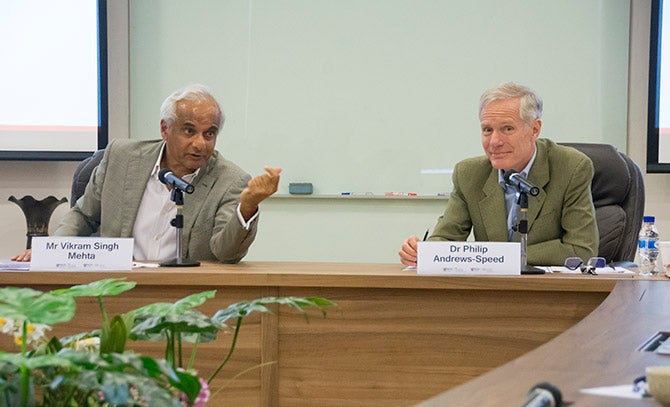
| Event Title: | ISAS-ESI Joint Seminar |
| Topic: | India’s Global Energy Engagements: Ambitions and Outcomes |
| Date/Time: | 31 August 2018 | 15:00 - 17:00 |
| Venue: | ISAS Board Room, Level 9, 29 Heng Mui Keng Terrace |
| Speaker/s: | Mr Vikram Mehta |
| Description: | The session discussed India’s energy crisis and global engagements. The speaker attributed India’s energy crisis to three broad factors – (1) its increasing demand for energy, stemming from its rising population, increasing urbanisation and cumulative impact of policies such as subsidised pricing, inefficiency in usage of energy, and lack of coordination among different governmental agencies – which have encouraged the wasteful consumption of energy in the country; (2) inability of energy supply to keep in pace with demands due to resource constraints, absence of infrastructure to access energy and bring to consumers, pricing mechanism and policies that discourage in investment in domestic productions, and (3) inadequate investment in cleaner energy and obliviousness to environmental concerns.
He highlighted how India is dependent on other nations for its energy supplies. Although India is aggressively increasing its solar generation capacity, the dependence on fossil fuels for transportation and coal for generation is likely to continue in the foreseeable future, he asserted. He shared that India imports 82% of its oil, mainly from Iraq, Saudi Arabia and Iran. Its gas is mostly imported from Qatar, Australia, the USA and Russia. India’s coal imports are also increasing although it has the 5th largest deposits of coal in the world – its major suppliers include Australia, USA, Indonesia and South Africa. He noted that most of India’s relationships with the countries have been transactional and unembedded on strategic relationship. As such, India has been unable to establish how it would protect its assets in these countries in the event of geo-political upheaval or domestic strife. He made particular mention of the possible effects of ongoing conflicts and issues in the Middle-East (e.g. US sanctions on Iran, Saudi Arabian relations with Iran and Qatar) on India given the latter’s heavy reliance on energy imports from the region. He also addressed the lack of an agency in India that can take a holistic overview of how India can deploy its “balance sheet” in regards to its energy sector, despite being heavily invested in global markets. To enhance the competitiveness of power overtures or initiatives and ensure India’s investments are protected, he suggested creating coordinating mechanisms in the PM office. |
| Youtube: | https://youtu.be/zM1V9S8oKJM |


